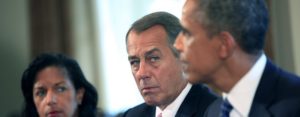
As expected, Republicans emerged from the meeting declaring they had no plans to meet the president’s demands, putting the government shutdown in its third day with no resolution in sight.
House Speaker John A. Boehner, Republican of Ohio, said after the meeting that the president “will not negotiate,” while Senate majority leader Harry Reid, Democrat of Nevada, said Democrats would agree to spending at levels already passed by the House.
“My friend John Boehner cannot take ‘yes’ for an answer,” Reid said.
The statements uttered by Republicans have begun to sound inane, such as this one from an Indiana representative in the House.
“We’re not going to be disrespected,” Rep. Marlin Stutzman (R-Ind.) told The Washington Examiner. “We have to get something out of this. And I don’t know what that even is.”
With no clear plan and no way out of this mess they created without severe embarrassment, Republicans have taken to trying to distort the message so that voters will get confused about who started it all.
They started posting pictures on social media of shuttered national monuments in Washington, with accompanying captions claiming that World War II vets and others couldn’t gain access because of Obama’s stubborn refusal to negotiate with Republicans.
In a meeting with Wall Street executives to enlist their help, and then in an interview with CNBC before his meeting with congressional leaders, Obama said he needed to draw a firm line “to break that fever” in the House among hard-line conservatives who keep making unreasonable fiscal demands, resulting in government by crisis.
“As soon as we get a clean piece of legislation that reopens the government — and there is a majority for that right now in the House of Representatives — until we get that done, until we make sure that Congress allows Treasury to pay for things that Congress itself already authorized, we are not going to engage in a series of negotiations,” Obama told CNBC.
Boehner has been afraid to bring the so-called clean continuing resolution to the House floor for a vote because it would easily pass, mostly with Democrats’ votes, and likely prompt a conservative backlash that could cost him his leadership office.
“If we get in the habit where a few folks, an extremist wing of one party, whether it’s Democrat or Republican, are allowed to extort concessions based on a threat of undermining the full faith and credit of the United States, then any president who comes after me — not just me — will find themselves unable to govern effectively,” he said.
Lawmakers have never failed to raise the debt ceiling, but experts agree that the fallout could be catastrophic. If Congress failed to raise the debt ceiling, the government would have to get by with just the amount of cash that comes in every day.
Former Republican budget staffer Steve Bell told the New York Times it would mean “the Treasury has to wait all day for money to come in and see how much money they have, and see how much they can pay,” he said. “It’s kind of a stunning thing because any business that ran that way would be bankrupt.”
Two years ago, when Congress looked like it might not raise the debt ceiling, the government’s AAA bond rating was downgraded and the stock market plunged.
Even though stocks have rebounded and the government is still able to borrow money at rock-bottom prices, economist Nariman Behravesh of IHS Global Insight said, it’s a dangerous gambit.
“The effect could be big and it would be global,” Behravesh says, “because the ripple effects would just spread all over the world.”
White House staff were fanning out to meet with business leaders on the debt ceiling. Separately, Treasury Secretary Jacob J. Lew; Gene B. Sperling, the chief White House economic adviser; and Valerie Jarrett, Obama’s liaison to business groups, held a conference call with members of the Business Roundtable, who are leaders of major corporations.
“I haven’t seen this sense of urgency among business leaders,” said one administration official. “They’re asking, ‘What can we do?’ ”
But there’s not much corporate leaders can do, since the Republican Party is now in the thrall of Tea Party conservatives, who are suspicious of big business for its reliance on federal contracts.
According to the New York Times, in the meeting with financial executives, according to a participant, Vice President Joe Biden said, “It’s a different breed of cat up there.”


